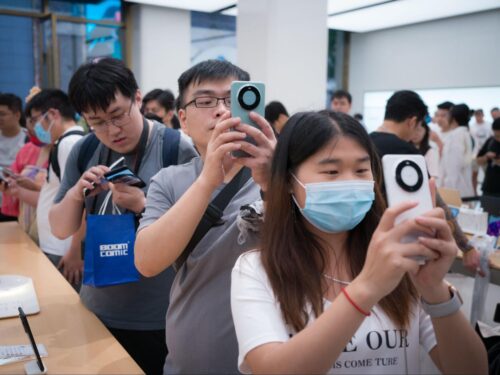Chanel mocked on Chinese social media after losing trademark lawsuit against Huawei
Internet users are jeering at French fashion brand Chanel after it lost a trademark infringement lawsuit to Chinese mobile phone giant Huawei.

In a battle over similar logos, French fashion house Chanel has lost a trademark infringement lawsuit filed against Huawei, China’s leading telecommunications equipment maker, according to a judgment handed down by a top European court.
In a press release (in Chinese) released on April 21, the General Court of the European Union dismissed Chanel’s action, arguing that after an examination of the signs in question “with regard to their visual, phonetic, and conceptual aspects,” it concluded that while they shared “some similarities,” their “visual differences are significant.”
The spat between the companies began in September 2017 when Huawei sought approval from the European Union Intellectual Property Office (EUIPO), a trademark body, to register a logo for its computer software, which features two semicircles interlocking vertically. Chanel swiftly objected to Huawei’s attempt, claiming that the Chinese firm’s mark “bore similarities to its own earlier French marks registered for perfumes, cosmetics, costume jewelry, leather goods, and clothes.”
In 2019, EUIPO rejected Chanel’s application, saying that the logos were not similar and would not likely cause confusion among the general public. The luxury brand challenged the ruling at the Luxembourg-based General Court, which upheld the previous decision this week.
“In particular, Chanel’s marks have more rounded curves, thicker lines, and a horizontal orientation, whereas the orientation of the Huawei mark is vertical,” the court ruled.
On Chinese social media, the response to the news has largely hinged on nationalism-fueled celebration tied to Huawei’s identity as a homegrown brand. Many supporters of Huawei accused Chanel of pengci (碰瓷 pèngcí) — literally, “breaking porcelain” in Chinese, a slang phrase meaning to intentionally pose as a victim in order to get something — it’s most often used for people who “fall” in front of moving cars and then extort large amounts of monetary compensation from the drivers. Similarly, Weibo commenters asserted, the fashion house had manufactured a case of IPR infringement in order to gain publicity and tarnish Huawei’s international reputation.
“Shameless! Chanel needs to stop clout-chasing with fake claims,” a Weibo user wrote (in Chinese). Another commented, “It’s obvious that Chanel picked a Chinese brand as a target and attempted to extort money from Huawei.”
Nationalistic sentiment can be a powerful consumer force in China, and Huawei has embraced the image of a patriotic icon suffering unfair treament on the global stage. So although the tech giant’s reputation outside of China has taken a serious battering in recent years, the external controversies seem to have helped the brand in its domestic market.






